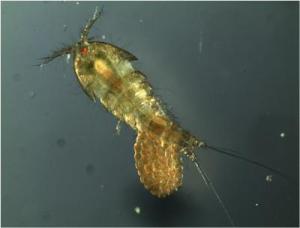摘要:近日,美国加州大学戴维斯分校的科学家们通过对一种微型的海滨动物试验得出,动植物未必能够通过进化摆脱气候变化带来的威胁,可能还没完成进化就已灭亡。
供试验的海洋水蚤(Tigriopus californicus)体长约1毫米,广泛分布在海岸潮湿的岩石周围,在野外,这些水蚤能够承受的最高温为20℃。科学家们通过逐渐增加环境温度,不断筛选耐热个体进行培育。试验表明,这类微型动物的耐热性极低,温度仅仅增加了0.5℃,大部分水蚤就已经死亡,而存活的小部分个体连续培育10代后也相继死亡。
虽然水蚤地域分布广泛,但由于流动性不大,获取新型基因的可能性较小,因此大自然中,这类生物很难有质的进化。科学家们非常担心这些生物是否有能力适应数十年的气候变化。
其他一些鸟类及植物等也同样面临气候变化的压力,而且它们的栖息地还受到人类的严重破坏。现在的问题是,许多动植物已经处于生存的极端温度,但大自然却不一定会选择它们。
生物探索推荐原文链接:
Can Evolution Outpace Climate Change? Tiny Seashore Animal Suggests Not

Pictured: The tide pool copepod Tigriopus californicus is found from Alaska to Baja California -- but in a unique lab study at UC Davis, the animals showed little ability to evolve heat tolerance over 10 generations.
Animals and plants may not be able to evolve their way out of the threat posed by climate change, according to a UC Davis study of a tiny seashore animal. The research is published in the journal Proceedings of the Royal Society B.
The tide pool copepod Tigriopus californicus is found from Alaska to Baja California -- but in a unique lab study, the animals showed little ability to evolve heat tolerance.
"This is a question a lot of scientists have been talking about," said study co-author Eric Sanford, an associate professor of evolution and ecology at UC Davis and a researcher at the university's Bodega Marine Laboratory. "Do organisms have the ability to adapt to climate change on a timescale of decades?"
UC Davis graduate student Morgan Kelly, the first author of the paper, collected copepods from eight locations between Oregon and Baja California in Mexico. The tiny shrimplike animals, about a millimeter long, live in tide pools on rocky outcrops high in the splash zone.
Kelly grew the short-lived copepods in the lab for 10 generations, subjecting them to increased heat stress to select for more heat-tolerant animals.
At the outset, copepods from different locations showed wide variability in heat tolerance. But within those populations, Kelly was able to coax only about a half-degree Celsius (about one degree Fahrenheit) of increased heat tolerance over 10 generations. And in most groups, the increase in heat tolerance had hit a plateau before that point.
In the wild, these copepods can withstand a temperature swing of 20 degrees Celsius a day, Kelly said. But they may be living at the edge of their tolerance, she said.
Although the copepods are widespread geographically, individual populations are very isolated, confined to a single rocky outcrop where wave splash can carry them between pools. That means there is very little flow of new genes across the population as a whole.
"It's been assumed that widespread species have a lot of genetic capacity to work with, but this study shows that may not be so," said co-author Rick Grosberg, professor of evolution and ecology at UC Davis. Many other species of animals, birds and plants face stress from climate change, and their habitats have also been fragmented by human activity -- perhaps more than we realize, he said.
"The critical point is that many organisms are already at their environmental limits, and natural selection won't necessarily rescue them," Grosberg said.
The study was funded by the National Science Foundation.







